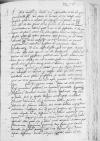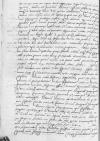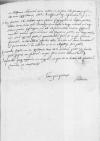Nisi manum et anulum orig. anullum⌈anulumanulum orig. anullum⌉ tuum agnovissem in his ⌊⌋, quas familiaribus
ill(ustrissimi) or ill(ustris)⌈ill(ustrissimi)ill(ustrissimi) or ill(ustris)⌉
domini ⌊comitis in Tarnow⌋ ad me dedisti, nomen profecto, quod a te omissum est, cognoscere non poteram. Et quamquam sero illae ad me perlatae sunt, fuerunt tamen (ut tuae omnes solent) iucundissimae, et officium, quod a me in his postulabas, cum his, qui equos ad ⌊caesarem⌋ attulerunt, libentissime simul ac diligentissime praestiti, quod ipsi testari poterunt. Effeci praeterea, ne non donati abirent, quamquam in his angustiis res nostrae versantur, ut pecuniam profundere non valeamus. Existimo tamen eos contentos abire intellexisseque te, licet absentem, plurimum apud nos posse, id quod in rebus omnibus dabo operam, ut omnes intelligant. Ceterum non possum non tecum expostulare, quod ad
⌊oratorem Gallum⌋ scribens mei adeo fueris oblitus, ut nec te valere (quod me vehementer optare satis persuasum habes) scribere volueris. Ego vero
ad te ⌊⌋, primum per eum nobilem, quem pro negotio ⌊Prussiae⌋ hic dimisisti, et deinde per ⌊Eingher⌋ nostrum, qui litteras meas tabellario recta istuc proficiscenti se dedisse asseveravit. Quae an ad te pervenerint litterae, nescio, pervenisse autem vehementer cupio.
Quae hic agamus, accipe. ⌊Caesar⌋, ubi vidit omnem prope Germanicum peditatum et equitatum praecessisse legionemque Hispanicam ⌊Patavium⌋ secundo flumine applicuisse, atque hinc ex ⌊Italia⌋, inde ex ⌊Gallia Belgica⌋ omnes copias incredibili celeritate adventare omniaque
tormenta bellica parata esse, ulterius hic immorari noluit, sed
omisso balneo ac pristinae valetudini restitutus, heri ad exercitum
profectus est. ⌊Quem⌋ nos missis aliquot tum in ⌊Hispaniam⌋ tum in ⌊Italiam⌋ tabellariis, cras sequemur. ⌊Turcae⌋ (veluti ex ⌊Vienna⌋ ad nos
scriptum est) nondum oppidulum orig. oppidullum⌈oppidulumoppidulum orig. oppidullum⌉ illud, quod vix per biduum tantam obsidionem sustinere posse credebamus, expugnare potuerunt. Eorum classis, quae adverso ⌊Danubio⌋ ⌊Strigonium⌋ praetergressa erat,
⌊Posonium⌋, quam ⌊Petrus Sapata⌋ Hispanus tuendam suscepit, aggredi ausa non est,  UUB, H.154, f. 93v ita ut nec terra nec aqua tanti apparatus dignum aliquid hactenus egerint. Milites ad praesidium ⌊Viennae⌋ dispositi constanter affirmant umquam se venientibus ⌊Turcis⌋ urbis portas occlusuros. Quid hic ⌊hostes⌋ facturi sint, nescio, licet communis opinio apud nos sit ⌊Turcam⌋, ubi copias nostras congregatas intelliget vastatis agris abiturum. Ego autem vix mihi persuadere possum tantum ⌊principem⌋ tantum itineris confecisse, tantum laboris hausisse et pecuniarum effu{n}disse, ut rebus intentatis, nedum infectis, fugeret. Sed dicunt aliqui, non putabat ⌊Germaniam⌋ unitis viribus in eum ruituram nec ⌊regem Gallum⌋, a quo (ut fertur) sollicitatus fuerat, domi quieturum. Atqui cf. Cic. Off. 1.81 Quamquam hoc animi, illud etiam ingenii magni est, praecipere cogitatione futura et aliquanto ante constituere, quid accidere possit in utramque partem et quid agendum sit, cum quid evenerit, nec committere, ut aliquando dicendum sit “non putaram”.; V. Max. 7.2.2 Scipio vero Africanus turpe esse aiebat in re militari dicere “non putaram”, videlicet quia explorato et excusso consilio quae ferro aguntur administrari oportere arbitrabatur. Summa ratione: inemendabilis est enim error, qui violentiae Martis committitur.; Sen. Dial. 4.31.4 Turpissimam aiebat Fabius imperatori excusationem esse “non putaui”, ego turpissimam homini puto. Omnia puta, exspecta ⌊turpe est ⌊imperatori⌋ dicere: non putaramcf. Cic. Off. 1.81 Quamquam hoc animi, illud etiam ingenii magni est, praecipere cogitatione futura et aliquanto ante constituere, quid accidere possit in utramque partem et quid agendum sit, cum quid evenerit, nec committere, ut aliquando dicendum sit “non putaram”.; V. Max. 7.2.2 Scipio vero Africanus turpe esse aiebat in re militari dicere “non putaram”, videlicet quia explorato et excusso consilio quae ferro aguntur administrari oportere arbitrabatur. Summa ratione: inemendabilis est enim error, qui violentiae Martis committitur.; Sen. Dial. 4.31.4 Turpissimam aiebat Fabius imperatori excusationem esse “non putaui”, ego turpissimam homini puto. Omnia puta, exspecta ⌋. Praeterea, ubi video hos duos potentissimos orbis ⌊monarchas⌋ perpetua hactenus felicitate usos ad conserendas manus properare, duos instructissimos ac florentissimos exercitus, quorum similes nondum usquam locorum congregatos esse
existimo, parvo adeo locorum intervallo disiunctos et avide alter in
alterius exitium ruere, non possum mihi persuadere, quin magnam
aliquam rerum metamorphosim visuri simus. Spero tamen, quod hieme{n}s nos ab hoc dubio quam primum liberabit. Copiae nostrae erunt longe,
quam credebamus, maiores, adeo magna hominum turba huc confluit.
Pecunia<m> nobis ⌊Hispania⌋ suppeditabit, quae vix credas, quanta animi promptitudine in hac expeditione vires et facultates impendat, ut, nisi Hispanus essem, servatam ⌊Germaniam⌋ ⌊Hispanis⌋ deberi auderem
asseverare. Nemo erat, qui ⌊Strigoniam⌋ propugnandam susciperet. ⌊Lescanus⌋ Cantaber inventus est, eam qui provinciam lubens assumpsit. ⌊Posonium⌋ deserere decreverant hi, quibus eius custodia commissa erat, ubi classem Turcicam ⌊Strigonium⌋ praetergressam audierunt. ⌊Petrus Sapata⌋ Carpetanus, qui conscribendi Ungarici equitatus gratia eo venerat, ultro id muneris subivit, et tamen ⌊Turcae⌋ nec ⌊Lescanum⌋, nec Sapatam
tentare ausi sunt. Viden, quo me perduxerit stultitia, ut factus sim meae gentis encomiastes, tu autem ea libertati, qua tecum semper usus sum, tribues. Misi ad te superioribus diebus chirotechas orig. cirothecas⌈chirotechaschirotechas orig. cirothecas⌉, quibus cum alicuius puellae gratiam captares, nunc indusii ornamentum manu cuiusdam formosissimae nymphae
UUB, H.154, f. 93v ita ut nec terra nec aqua tanti apparatus dignum aliquid hactenus egerint. Milites ad praesidium ⌊Viennae⌋ dispositi constanter affirmant umquam se venientibus ⌊Turcis⌋ urbis portas occlusuros. Quid hic ⌊hostes⌋ facturi sint, nescio, licet communis opinio apud nos sit ⌊Turcam⌋, ubi copias nostras congregatas intelliget vastatis agris abiturum. Ego autem vix mihi persuadere possum tantum ⌊principem⌋ tantum itineris confecisse, tantum laboris hausisse et pecuniarum effu{n}disse, ut rebus intentatis, nedum infectis, fugeret. Sed dicunt aliqui, non putabat ⌊Germaniam⌋ unitis viribus in eum ruituram nec ⌊regem Gallum⌋, a quo (ut fertur) sollicitatus fuerat, domi quieturum. Atqui cf. Cic. Off. 1.81 Quamquam hoc animi, illud etiam ingenii magni est, praecipere cogitatione futura et aliquanto ante constituere, quid accidere possit in utramque partem et quid agendum sit, cum quid evenerit, nec committere, ut aliquando dicendum sit “non putaram”.; V. Max. 7.2.2 Scipio vero Africanus turpe esse aiebat in re militari dicere “non putaram”, videlicet quia explorato et excusso consilio quae ferro aguntur administrari oportere arbitrabatur. Summa ratione: inemendabilis est enim error, qui violentiae Martis committitur.; Sen. Dial. 4.31.4 Turpissimam aiebat Fabius imperatori excusationem esse “non putaui”, ego turpissimam homini puto. Omnia puta, exspecta ⌊turpe est ⌊imperatori⌋ dicere: non putaramcf. Cic. Off. 1.81 Quamquam hoc animi, illud etiam ingenii magni est, praecipere cogitatione futura et aliquanto ante constituere, quid accidere possit in utramque partem et quid agendum sit, cum quid evenerit, nec committere, ut aliquando dicendum sit “non putaram”.; V. Max. 7.2.2 Scipio vero Africanus turpe esse aiebat in re militari dicere “non putaram”, videlicet quia explorato et excusso consilio quae ferro aguntur administrari oportere arbitrabatur. Summa ratione: inemendabilis est enim error, qui violentiae Martis committitur.; Sen. Dial. 4.31.4 Turpissimam aiebat Fabius imperatori excusationem esse “non putaui”, ego turpissimam homini puto. Omnia puta, exspecta ⌋. Praeterea, ubi video hos duos potentissimos orbis ⌊monarchas⌋ perpetua hactenus felicitate usos ad conserendas manus properare, duos instructissimos ac florentissimos exercitus, quorum similes nondum usquam locorum congregatos esse
existimo, parvo adeo locorum intervallo disiunctos et avide alter in
alterius exitium ruere, non possum mihi persuadere, quin magnam
aliquam rerum metamorphosim visuri simus. Spero tamen, quod hieme{n}s nos ab hoc dubio quam primum liberabit. Copiae nostrae erunt longe,
quam credebamus, maiores, adeo magna hominum turba huc confluit.
Pecunia<m> nobis ⌊Hispania⌋ suppeditabit, quae vix credas, quanta animi promptitudine in hac expeditione vires et facultates impendat, ut, nisi Hispanus essem, servatam ⌊Germaniam⌋ ⌊Hispanis⌋ deberi auderem
asseverare. Nemo erat, qui ⌊Strigoniam⌋ propugnandam susciperet. ⌊Lescanus⌋ Cantaber inventus est, eam qui provinciam lubens assumpsit. ⌊Posonium⌋ deserere decreverant hi, quibus eius custodia commissa erat, ubi classem Turcicam ⌊Strigonium⌋ praetergressam audierunt. ⌊Petrus Sapata⌋ Carpetanus, qui conscribendi Ungarici equitatus gratia eo venerat, ultro id muneris subivit, et tamen ⌊Turcae⌋ nec ⌊Lescanum⌋, nec Sapatam
tentare ausi sunt. Viden, quo me perduxerit stultitia, ut factus sim meae gentis encomiastes, tu autem ea libertati, qua tecum semper usus sum, tribues. Misi ad te superioribus diebus chirotechas orig. cirothecas⌈chirotechaschirotechas orig. cirothecas⌉, quibus cum alicuius puellae gratiam captares, nunc indusii ornamentum manu cuiusdam formosissimae nymphae  UUB, H.154, f. 94r in ⌊Hispania⌋ elaboratum ad te mitto, ut si forte illis parum profeceris, hoc eam aggrediaris.
UUB, H.154, f. 94r in ⌊Hispania⌋ elaboratum ad te mitto, ut si forte illis parum profeceris, hoc eam aggrediaris.
Vale.
Si ⌊rex Iohannes⌋, ubi videbit copias ⌊caesaris⌋ congregatas in ⌊hostem⌋ prodire, vellet suas vires nostris adiungere ac hostes a tergo adoriri vel eorum
saltem pontes infringere, ut illi ad conserendas manus cogerentur,
maximum nomen apud Christianos sibi comparare posset ac longe melius
rem suam ageret. Quodsi quemadmodum ⌊Itali⌋, ita et ⌊ipse⌋ ⌊caesaris⌋
clementiam et liberalitatem expertus esset, sat scio eum hanc occasionem non praetermissurum. Tu vide, an ea in re aliquid praestare possis. ⌊Granvella⌋ iussit, ut de gradario iterum ad te scriberem, quod ego invitus
facio, sed quia me facturum recepi, fidem meam liberare volui. ⌊Pimpinellus⌋ quoque rogavit, ut negotium de quo ad te ⌊⌋, tibi commendarem. Commendo et iterum vale.
 UUB, H.154, f. 93v ita ut nec terra nec aqua tanti apparatus dignum aliquid hactenus egerint. Milites ad praesidium
UUB, H.154, f. 93v ita ut nec terra nec aqua tanti apparatus dignum aliquid hactenus egerint. Milites ad praesidium  UUB, H.154, f. 94r in
UUB, H.154, f. 94r in 


